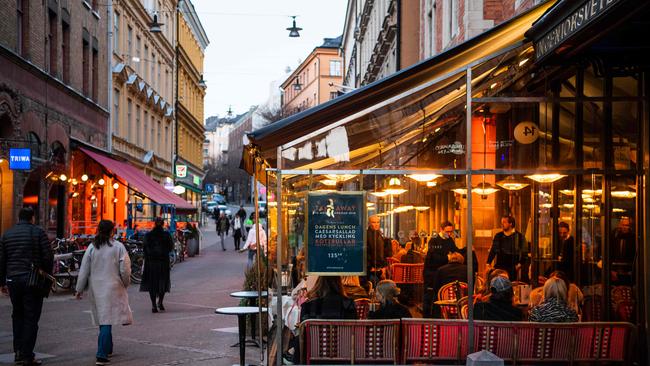Coronavirus: Elderly Swedes in lockdown and children in school help pursue herd immunity
Swedish public health experts argue that the virus can be stopped solely by vaccination or by herd immunity.

In the bright spring sun, flaxen-haired families held barbecues on the beach. Crowds in this provincial Swedish town shopped in designer boutiques and in supermarkets laden with toilet paper and pasta.
As much of the world hunkered down at home to hide from the coronavirus, life in Sweden was — for many — carrying on almost as normal last week.
Swedish public health experts argue that the virus can be stopped solely by vaccination or by herd immunity.
Since a vaccine for widespread use is still at least a year away, they say, the only possible way to stop the epidemic is by isolating vulnerable people while allowing the virus to spread as slowly as possible through the healthy population as they build resistance.
Scientists at Sweden’s public health agency say this will also prevent a harsh resurgence in infections. “It’s important to think how long can you keep these measures going,” said state epidemiologist Anders Tegnell.
“What we’re doing now we think we can do for a long time. Of course it slows down many things in society but we can make it work. We all know that this is going to go on for months. You can’t keep schools closed for months.”
There were 3447 infections in Sweden and 105 deaths by Sunday. Some restrictions have been imposed to slow the spread of the virus and protect the vulnerable.
Gatherings of more than 50 people are banned and colleges and universities are closed. Those over 70, or with pre-existing health problems, have been asked to stay at home except for a daily walk. But restaurants and bars are open and children are going to school.
The authorities say Swedes can be trusted to follow recommendations to socially distance and do not need draconian laws to slow the spread of the virus.
“If the public health agency goes out and says stay home, people do stay home,” Dr Tegnell said. “My feeling is that the actual impact of having a law in another country and a recommendation in Sweden isn’t that different.”
Last week The Netherlands, which has been aiming for herd immunity, announced a ban on almost all gatherings amid public fears over a large projected number of deaths.
In Sweden, scientists at the public health agency are shaping the national response to the virus together with the government, but — by law — politicians cannot intervene in the details of its implementation.
“The agencies have the technical and scientific expertise. The government has the expertise in policies and politics,” Dr Tegnell said. “Most experts in the world agree that there’s no way of stopping this any more. It hits almost every country in the world. We can’t get rid of it, that never happened in history — only with smallpox after decades of vaccination.”
Anders Bjorkman, a leading epidemiologist who spent years at the forefront of malaria research, challenges the model used by researchers at Imperial College London, which estimated that about 1 per cent of those who contracted the virus would die. He argues that the estimate is misleading as it does not include those with the virus who exhibit no symptoms.
“They say there’s 1 per cent mortality. That’s not true. They completely discard the asymptomatics,” he said. “In all these groups there are some who don’t have symptoms and aren’t reported. In Sweden the average age of all reported corona cases is 56 years roughly. The average age of the population is 40 … and I believe that all age groups have been more or less equally exposed. Among the younger population, those under 40, there are so many non-symptomatics.”
The death rate in Sweden, he said, was likely to be closer to 0.1 per cent than 1 per cent. Hundreds, rather than tens of thousands, would die before herd immunity was achieved.
The public health agency said that in tests of about 5000 people who had returned to Sweden from visits to Italy, the few hundred that were positive all exhibited mild symptoms — implying that there could be a large number of people in Sweden who are asymptomatic — with mild or no symptoms — who have not sought medical treatment.
Joacim Rocklow, an epidemiologist at Umea University, said the asymptomatic theory was “a huge risk”.
The Sunday Times






To join the conversation, please log in. Don't have an account? Register
Join the conversation, you are commenting as Logout